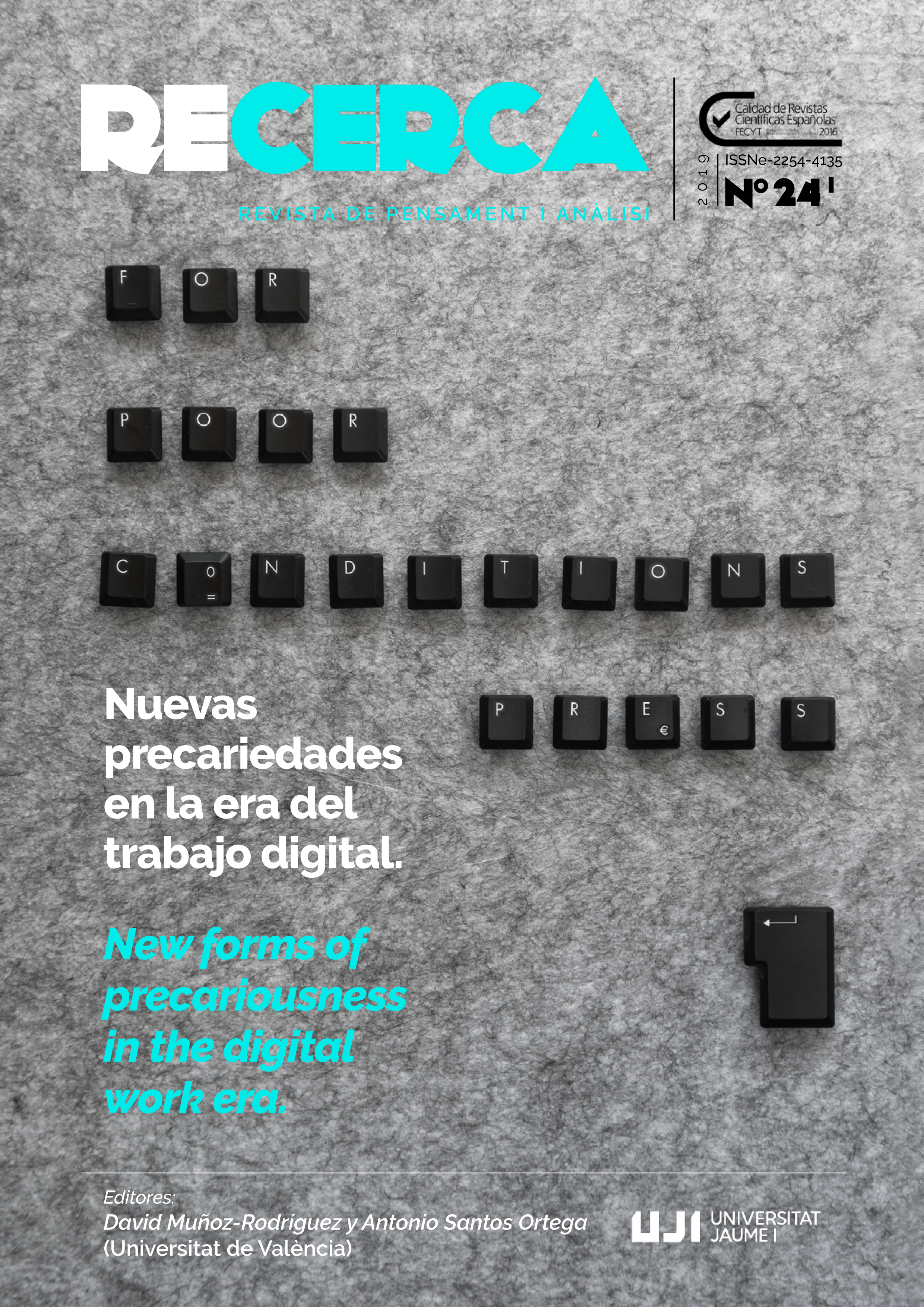Preserving Precariousness, Queering Debt
Contenido principal del artículo
Resumen
Precarisation means more than insecure jobs, more than the lack of security given by waged employment. By way of insecurity and danger it embraces the whole of existence, the body, modes of subjectivation. It is threat and coercion, even while it opens up new possibilities of living and working. Precarisation means living with the unforeseeable, with contingency. In this article I analyse how the new precarious living and working conditions and the privatisation of protection against precariousness are conditions of both a prospering financial capitalism and its concomitant debt economy. This economy is based on the expansion of productivity that involves less work, in the traditional sense, than subjectivation. A new subjectivity is needed to assume responsibility, to take on debt, and to internalise the risks both as guilt and as debt: a personality that is doubly indebted and responsible for oneself.
La precarización significa más que empleos inseguros, más que la falta de seguridad que proporciona el empleo asalariado. A través de la inseguridad y el peligro, la precarización abarca toda la existencia, el cuerpo, los modos de subjetivación. Es una amenaza y una forma de coerción, aunque también abre nuevas posibilidades de vivir y trabajar. Precarización significa vivir con lo imprevisible, bajo la contingencia. En este artículo analizo cómo las nuevas condiciones de vida y de trabajo precarias y la privatización de la protección contra la precariedad son condiciones, tanto de un próspero capitalismo financiero, como de su concomitante economía de la deuda. Esta economía se basa en la expansión de la productividad, la cual implica más bien procesos de subjetivación que lo que hemos entendido por trabajo en el sentido tradicional. Se necesita una nueva subjetividad para asumir responsabilidades, para endeudarse e internalizar los riesgos como culpa y como deuda: una personalidad doblemente endeudada y responsable de sí misma.
Descargas
Detalles del artículo
Citas
Benjamin, Walter (1940). On the Concept of History. Retrieved from: https://www.marxists.org/reference/archive/benjamin/1940/history.htm [Consulted 16 May, 2018]
Butler, Judith (2009). Frames of War. When Is Life Grievable?. London/New York: Verso.
Cixous, Hélène (1981). Castration or Decapitation? Signs. Journal of Women in Culture and Society, 7.1, 41-55.
Derrida, Jacques (1992). Given Time: I. Counterfeit Money. Chicago: University of Chicago Press.
Desideri, Valentina & Harney, Stefano (2013). Fate Work: a conversation, Ephemera: Theory and Politics in Organisation, 13(1), 159-176.
Dowling, Emma (2016). Love’s Labour’s Cost: The Political Economy of Intimacy, February 2016. Retrieved from: http://www.versobooks.com/blogs/2499-love-s-labour-s-cost-the-political-economy-of-intimacy [Consulted 15 May, 2018]
Harne, Stephano & Moten, Fred (2013) The Undercommons. Fugitive Planning & Black Study, Wivenhoe/New York/Port Watson: Minor Compositions.
Lazzarato, Maurizio (2012). The Making of the Indebted Man. An Essay of the Neoliberal Condition. Los Angeles: Semiotext(e).
Lazzarato, Maurizio (2015). Governing by Debt. Los Angeles: Semiotext(e).
Lorey, Isabell (2006). Governmentality and Self-Precarization: On the Normalization of Culture Producers. In Rosenblatt, Lisa. Transversal: Machines and Subjectivation. Retrieved from: http://transversal.at/transversal/1106/lorey/en [Consulted 15 May, 2018]
Lorey, Isabell (2014). Presentist Democracy. Exodus and Tiger’s Leap, Transversal Texts. Retrieved from: http://transversal.at/blog/Presentist-Democracy [Consulted 17 May, 2018]
Lorey, Isabell (2015a). State of Insecurity. Government of the Precarious. London: Verso.
Lorey, Isabell (2015b). Autonomy and Precarization. In Dockx, Nico & Gielen, Pascal (Eds.). Mobile Autonomy. Exercises in Artists’ Self-Organisation, Amsterdam: Valiz, pp. 39-52
Lorey, Isabell (2017). Presentist Democracy. Reconceptualizing the Present. In Latimer, Quinn & Szymczykds, Adam (Eds.). documenta 14. Munich: Reader, pp. 169-202.
Lorey, Isabell (2018a). Presentist Democracy: Destituent Breaks, Instituent Practices, Constituent Process. In Hlavajova, Maria (Ed.). Cambridge/MA, London: MIT Press (forthcoming).
Lorey, Isabell (2018b). The Power of the Presentist-Performative. On Current Democracy Movements. In Vujanovic, Ana & Piazza, Livia Andrea (Eds.): A Live Gathering: Performance and Politics, (forthcoming)
Lorey, Isabell & Neundlinger, Klaus (2012). Kognitiver Kapitalismus. Von der Ökonomie zur Ökonomik des Wissens. Einleitung. In Lorey, Isabell & Neundlinger, Klaus (Eds.). Kognitiver Kapitalismus, Wien: Turia + Kant, pp. 7-55.
Marazzi, Christian (2011). The Violence of Finance Capitalism. Los Angeles: Semiotext(e).
Nietzsche, Friedrich (2006). On the Genealogy of Morality and Other Writings. Cambridge: Cambridge University Press.
Precarias a la deriva (2014). Was ist dein Streik? – Militante Streifzüge durch die Kreisläufe der Prekarität. Vienna: Transversal Texts.
Raunig, Gerald (2013). Factories of Knowledge. Industries of Creativity. Los Angeles: Semiotext(e).
Raunig, Gerald (2016). Dividuum. Machinic Capitalism and Molecular Revolution. Vol. 1. Los Angeles: Semiotext(e).


